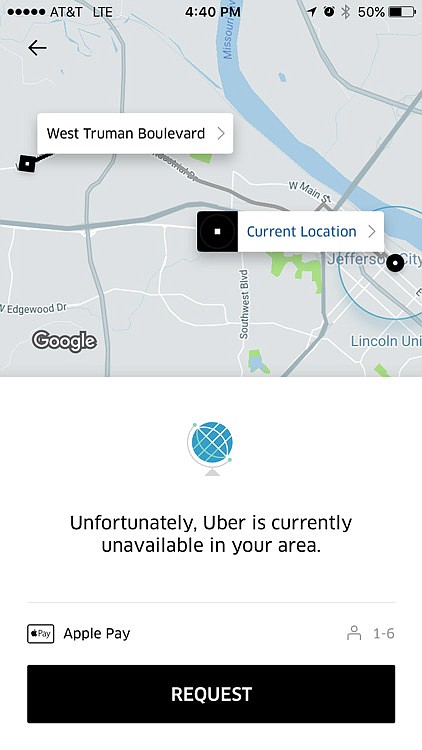Ready to hail your first Uber ride in Jefferson City limits? Not so fast.
The Jefferson City Council approved changes to the city code last Monday allowing for ride-hailing services like Uber and Lyft to begin operating in the city legally. A transportation network company (TNC) can now apply and obtain a permit within days, City Counselor Ryan Moehlman said.
As it turns out, though, the TNC that lobbied for the change is in no hurry to get on the road.
"Uber will begin operating in Jefferson City when statewide legislation is approved. We will launch operations in various cities across Missouri once there is a statewide regulation," said Charity Jackson, public affairs associate for Uber.
State Rep. Kirk Mathews' House Bill 130, which would authorize TNCs to operate statewide, soared through the Missouri House of Representatives early in the 2017 legislative session.
Its move through the Missouri Senate hasn't been as swift, as several amendments - ranging from local taxing prohibitions to airport regulations - have stalled its progress. After taking it up for floor debate last week, the Senate has returned the bill to the informal calendar, where it may or may not be picked up again.
State Sen. Bob Onder, R-Lake St. Louis, filed similar legislation, which is also pending on the Senate's informal calendar.
Jackson did not specify whether Uber's green light for Jefferson City drivers depended on the Legislature's initial approval, the governor's signature or a successful TNC law's Aug. 28 effective date. Nor did she specify whether Uber would begin offering service in Jefferson City if state legislation does not pass this year.
As of Tuesday afternoon, Jefferson City's Finance Department had not received any applications for TNC permits.
Jefferson City's renewed interest in updating its own regulations surfaced after Uber provided a reported 1,000 free rides in city limits during Gov. Eric Greitens' Jan. 9 inauguration on a special one-day permit.
The section of the city's amended vehicles-for-hire ordinance which governs TNCs is modeled after the proposed statewide legislation.
"The desire of the city was to really kind of mirror what the state was doing," for the sake of consistency, Moehlman said.
The city ordinance, while requiring local and national criminal background checks for TNC drivers, allows the companies to handle those background checks themselves.
Drivers for taxicab companies, governed by a separate section of the vehicles-for-hire ordinance, must undergo a city-administered background check for their initial licensure, with the company handling it in subsequent years. That's scaled back from the previous policy, which required the city-administered background check annually.
"We like to know who is operating a cab in the city," Moehlman said. "There's some valuable public safety information that can come from the police department and the city knowing who are operating cabs."
The city also will continue to regulate the rates taxis may charge customers, while TNCs may set their own fares as long as the calculation method or an estimated fare is disclosed before the passenger enters the vehicle.
"Rate regulation for taxi companies is pretty common, and it's part of the public protections that are built into cab regulations - so that way no matter who gets into a marked cab, they have a good idea of what their rate is going to be," Moehlman explained. "The difference with TNCs, at least how the TNCs state it, is use of the mobile app before you get into the cab and accept the fare; you know what the charge is going to be, pre-set."
Tom Landwehr, who owns Jefferson City's only current taxi service, Checker Cab, has expressed his concern previously that competition from TNCs, regulated differently, could harm his company's profitability especially in non-peak hours, as the city requires cab companies to operate 24/7.
Landwehr told the News Tribune he would consider asking city or state officials to consider matching taxicab and TNC regulations more closely if Checker Cab's profits suffered significantly.
"We would probably look to the city or the state to put taxi companies and ridesharing companies on a more equal playing field, as has been the case in several other states," he said.
In the meantime, he's looking at trimming some costs to prepare.
"Probably my biggest constant expense - one that does not vary with the amount of business you have - is dispatching costs," Landwehr said. "So we are currently looking into alternate forms of handling the dispatching system."
He also plans to examine Checker Cab's methods of recruiting and compensating drivers to keep the jobs competitive.
The city's updated vehicles-for-hire ordinance also makes way for new taxicab companies to enter the Jefferson City market more easily by eliminating the certificate of need requirement.
"Where you're giving people permission to do business in the city, that's really something that modern regulations have kind of moved away from, whether you're talking about utilities or other areas," Moehlman said. "When you have discretionary decisions like that in licensing schemes, that increases your potential for lawsuits.
"By getting rid of the certificate of need program, we're really putting ourselves in a better legal position to avoid conflicts that we really don't think we need to have."

